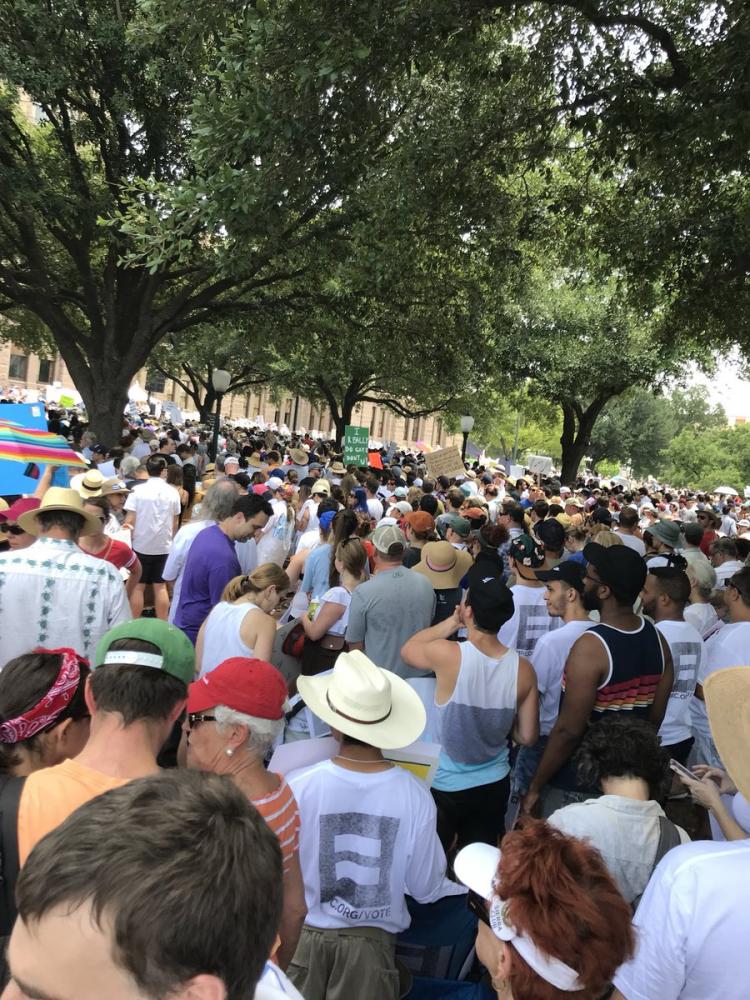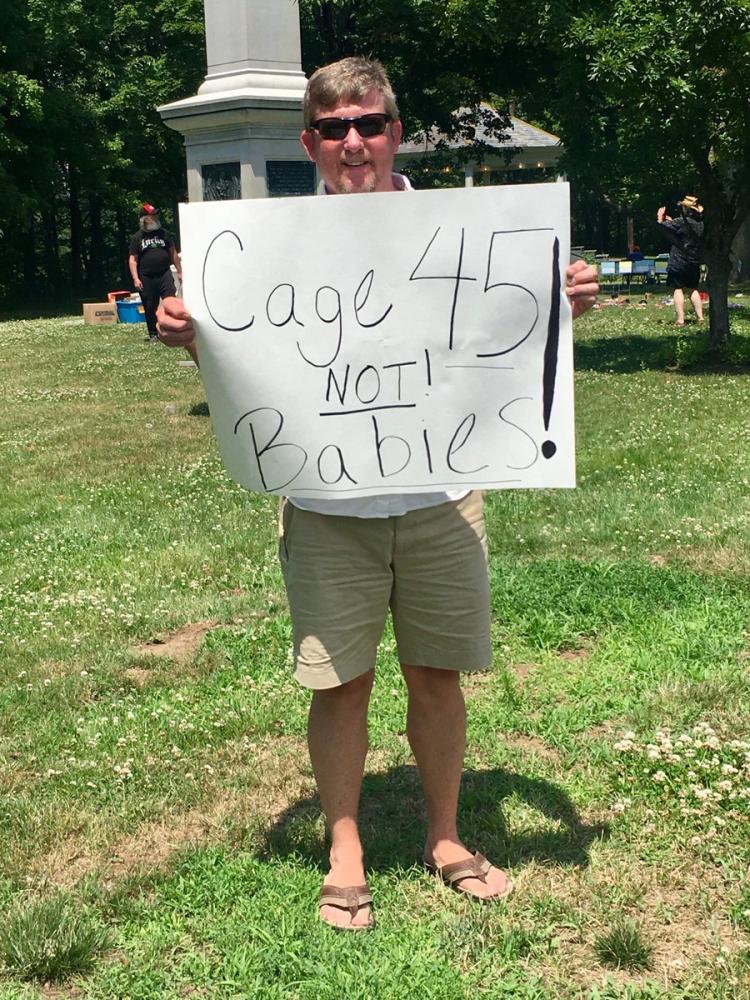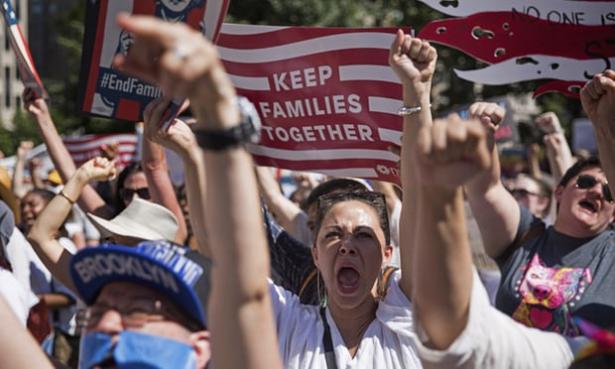Mass protests against Donald Trump and his immigration policies were held across the US on Saturday, in cities from Los Angeles to Boston and in state capitals and smaller towns between.
As large parts of the country sweltered beneath a heatwave, marchers braved the blistering sun to express fierce opposition to the president’s policy of separating undocumented immigrant families at the southern border. They also voiced concern over Trump’s forthcoming supreme court pick.
The president, who was playing golf at his club in New Jersey, attacked what he called “radical left” Democrats, who he said were behind calls to disband Immigration and Customs Enforcement (Ice), the agency central to his hardline immigration approach.
“To the great and brave men and women of Ice,” Trump tweeted early in the day, “do not worry or lose your spirit. You are doing a fantastic job of keeping us safe by eradicating the worst criminal elements. So brave! The radical left Dems want you out. Next it will be all police. Zero chance, It will never happen!”

Austin Texas
Immigration policy is a central pillar of Trump’s appeal to his supporters ahead of November’s midterm elections. It is also key to motivating opposition to the president, particularly among the surging progressive wing of the Democratic party..
In Washington on Saturday, protesters gathered in Lafayette Square, close to the White House. Organised by MoveOn, the American Civil Liberties Union and dozens of other groups, the Families Belong Together march featured star speakers Lin-Manuel Miranda, Alicia Keys and America Ferrera. Miranda sang a lullaby, Dear Theodosia, from his hit musical Hamilton.
John Holland of Takoma Park, Maryland, was among a group of Buddhist-affiliated protesters who held hands, sang and played a Tibetan singing bowl as an early speaker described the “amazing effect it can have on everyone if we move slowly”. Asked why he had decided to brave the 95F (35C) heat, he quipped: “Peer pressure.”
Like many present, Holland attended the Women’s March on the National Mall in January 2017. The capital has turned into a site of major protest, including the March for Science last year and more recently a student-led gun control effort, the March for Our Lives.
On Saturday New York also saw a major rally, as did Los Angeles, Dallas, Denver, Chicago, Boston and other big cities. Senior Democratic figures addressed crowds; in Boston, speakers included the possible 2020 presidential candidate Senator Elizabeth Warren and the congressman Joe Kennedy III. In LA, Senator Kamala Harris, another potential 2020 pick, spoke after John Legend performed. Smaller protests were staged at federal facilities in Texas and outside Trump’s New Jersey club, where around 200 people gathered.
Trump was expected to begin interviewing candidates to replace Anthony Kennedy, the supreme court justice who announced his retirement this week. The protests were also focusing on that choice, which is expected to turn the court sharply right, placing in jeopardy rulings such as Roe v Wade, the 1973 opinion which guarantees the right to abortion. This week, the court upheld Trump’s travel ban against Muslim-majority countries and dealt a heavy blow to unionised labour.

My husband, retired ICE Special Agent at #FamiliesBelongTogether rally in Brattleboro, VT today! I couldn’t be more proud
“This is an all-hands-on-deck, stop-the-madness moment,” national protest organiser Ai-jen Poo told the Guardian. “It’s not a red or blue thing … what you are seeing is the downright refusal to accept this administration’s policies.”
This month, Trump stopped the separations policy, after intense public outcry over images and recordings of children held in cages at federal facilities. But his order was unclear and the administration has been criticised for the lack of a plan to reunite around 2,000 children with their parents. The administration is now claiming the right to detain families indefinitely, ignoring a 1997 court settlement that limits how long children can be held.
At the Washington protest on Saturday, Kate Earle of Maryland held a sign that said: “Make The Handmaid’s Tale fiction again.” She said: “Reunification of families is a start but locking them up together is not a solution.”
In Indianapolis, thousands gathered outside the seat of government in the home state of Vice-President Mike Pence. As people cheered, Mahri Irvine, a 35-year-old anthropologist, spoke to the Guardian by phone.
“Our country is really, really close to the edge of the abyss of just committing some serious human rights violations,” she said. “In fact, we have already. To me, it’s upsetting if people don’t have that level of imagination to think, ‘How would I feel if I had to flee a violent country, and I was incarcerated, and my children were taken away from me?’”
From Eau Clare in Wisconsin, 22-year-old Victoria Duarte said the rally there had been heartening, despite starting with a man yelling: “If you cant speak English, get out of the country.”
“I was out there today for so many reasons,” she said, “but mainly because us young people feel a lot of anger and a lot of frustration. We want to put it into the community in action.”
Trump’s reference to “radical left Dems” may have been inspired by the surprise victory in a New York Democratic primary this week of young activist Alexandria Ocasio-Cortez. The 28-year-old, who shocked party stalwart Joe Crowley, describes herself as a democratic socialist and campaigned on a platform that included the abolition of Ice.
Pressure on Ice has also come from within. Nineteen senior agents sent an open letter to Kirstjen Nielsen, Trump’s homeland security secretary, saying it should be disbanded. The investigators said the immigration crackdown was interfering with the agency’s work against transnational criminal groups.
At the New York march, Lorette and Tim Maxwell had brought their five year-old daughter. “We’ve been trying to teach Penelope but it’s difficult to explain to her,” Tim said. “Like if a cop knocked on the door and took away mommy … How do you explain that to a child?”
Lorette said: “Everybody thought Trump was a joke but he is not a joke.”
If everyone who reads our reporting, who likes it, helps fund it, our future would be much more secure. For as little as $1, you can support the Guardian – and it only takes a minute. Thank you. Support The Guardian


Spread the word